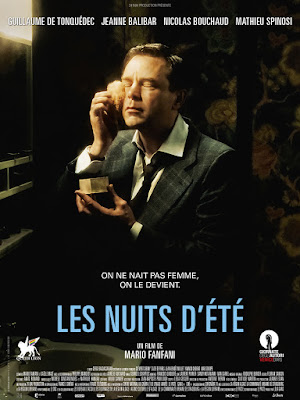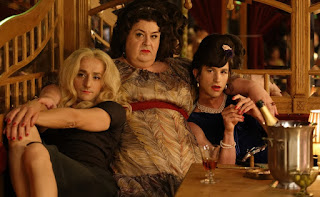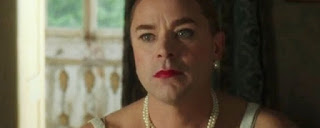 After its wonderfully dramatic and promising opening scene with one middle-aged transvestite dishing out therapy to another matronly looking one lying on the couch, Summer Nights slowly muddles it way through a series of stories that often fail to make much sense.
After its wonderfully dramatic and promising opening scene with one middle-aged transvestite dishing out therapy to another matronly looking one lying on the couch, Summer Nights slowly muddles it way through a series of stories that often fail to make much sense.The main plot strand concerns Mylene the one lying on the couch who will soon get up and change back into being Michel and dress in a style more suitable for a successful provincial French lawyer. When he is properly attired and ready to leave the old crumbling country mansion that he had inherited from his father, he tells ‘Flavia’ who been dispensing the advice earlier, that things have got to change once and for all. The house that he had re-christened Villa Mimi has been a bolt hole for all the local guys to act out as women, but now he wants to put a stop to this. Michel is running for Public Office to become the Chairman of the Chamber of Lawyers and he is afraid that word may get out about his secret life and ruin his chances, and much more.
Michel’s other concern is Helene his wife who he loves very deeply and to whom he has been telling that these stays away from their family home were because he needs some solitude to focus on some difficult legal cases.
The period is the late 1950’s where seemingly most of middle-class France is obsessed with the conflict in Algeria that is spiraling out of control resulting in the deaths of many young French men who have been conscripted into military service and posted to the war’s front line. This surfaces in one of the plot lines when Michel persuades Helene to take more part in their rather pretentious Country Club to help corner him some votes, but it backfires when she is asked to give a speech and uses the occasion to make her anti-war opinions known, which goes down like a lead balloon in this very patriotic audience.
 Whilst they are acting out being a respectable couple, Flavia is in a club that is the haunt of transvestites and has to rescue a young straight solder who has drunk too much. We are not sure if it is because he has realized into a gay bar by mistake, or the fact that he is about to be shipped out to Algeria. He wakes up intact in Flavia’s bed next morning and she/he sends the young man back to the barracks. He returns later in the tale which acts as an excuse to introduce some of the motley crew of the transvestites and a few show-stopping routines.
Whilst they are acting out being a respectable couple, Flavia is in a club that is the haunt of transvestites and has to rescue a young straight solder who has drunk too much. We are not sure if it is because he has realized into a gay bar by mistake, or the fact that he is about to be shipped out to Algeria. He wakes up intact in Flavia’s bed next morning and she/he sends the young man back to the barracks. He returns later in the tale which acts as an excuse to introduce some of the motley crew of the transvestites and a few show-stopping routines.At some point Helene discovers her husband in his female attire as his decision not to go back to the Country house was soon tossed aside, and when Michel becomes Mylene again he joins the other ‘ladies’ to performs ‘Le spectre de la rose’ which is part of a song cycle by Berlioz called ‘Summer Nights’.
The scene is a very clumsy attempt to link the entire story strands together but sadly they just do not gel. There is a hint that maybe Michel and Flavia were an ‘item’ possibly when they served in the war, but despite his desire to play out his feminine side, he seems as straight as the poor soldier who in the end is about as keen as joining his new transvestite friends as he is about staying in the military.
As for Helene whilst we know from her performance in the Club that she has scant regard for what society thinks of her, but we never know if she will ever be that forthright about accepting her husband’s predilections.
The movie by newbie French director Mario Fanfani, who also co-wrote the script, offers too many possibilities of really good story lines but then he fails to develop any of them satisfactorily which seems such a wasted opportunity.



